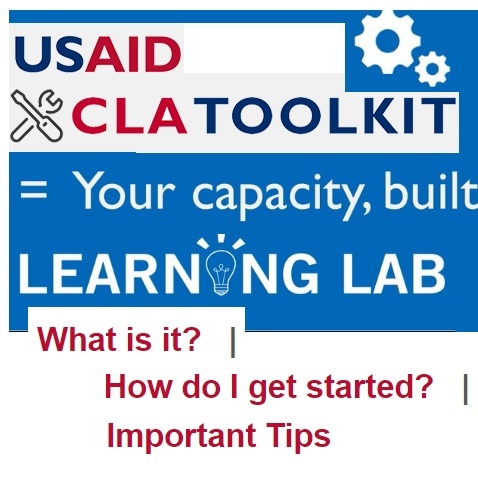Collaborating, Learning & Adapting (CLA) USAID's TOOLKIT... to Improve Capacity Development Programming
24/01/2018


If you want to make sure that your programs are coordinated with others, grounded in a strong Monitoring, Evaluation (M&E) base, and iteratively adapted to remain relevant throughout implementation, you might be interested to learn more about the USAID’s Collaborating, Learning, and Adapting (CLA) TOOLKIT, - a set of practices that help you plan and implement Program Cycle activities more effectively.
The purpose of M&E and Learning Practices is to apply Knowledge gained from evidence and analysis to improve development outcomes and ensure accountability for the resources used to achieve them. Learning from M&E means using M&E data/information as evidence for accountability and informing decision-making for management purposes, course adjustments, and future designs. .
This entry will introduce you to the CLA TOOLKIT and other related USAID's initiatives...
|
By the way ... From 22-26 January 2018 ... USAID LEARNING LAB challenges YOU to kick off 2018 by integrating a new CLA practice into your work, or be more intentional and systematic about an existing CLA practice. You can participate as an individual or a team. |
USAID FOSTERS...
|
COLLABORATION & LEARNING TO HELP REALIZE YOUR POTENTIAL |
USAID - the lead U.S. Government agency that works to end extreme global poverty and enable resilient societies to realize their potential (*) - supports robust efforts to foster Collaboration and Capacity Development, - to inform adaptation of programs, projects, and activities (as well as the business processes that support them), and to improve development results.
Through its LEARNING LAB Online Training, the USAID aims to empower organizations to generate an Action Plan (for their own priorities) and to secure strong commitments (through Collaboration - Learning and Adaption) to carry out the identified actions.
|
In the simplest terms, integrating Collaborating, Learning, and Adapting throughout the Program Cycle can help development practitioners address different challenges by thinking through:
|
COLLABORATING, LEARNING & ADAPTING (CLA)... |
IN CAPACITY DEVELOPMENT PROGRAMMING |
A free online CLA TOOLKIT - accessible though LEARNING LAB - houses practical tools, examples of what CLA looks like in practice and official guidance on how to plan for CLA programming.
The CLA itself can be seen as a Conceptual Framework for some principles and operational processes - to guide any important performance area. Particularly, in CTA TOOLKIT you will find a growing set of curated tools and resources on Collaborating, Learning and Adapting to help you plan and implement Program Cycle activities more effectively.
While providing a Framework of continuous improvement, CLA TOOLKIT can particularly be important for CAPACITY DEVELOPMENT, whereby CLA activities and processes can:
- Encourage reflection on the Capacity Development approaches that are or are not working,
- Generate learning about the most important types of Capacity to improve performance,
- Inform the adjustments that can improve performance and lead to systemic change.
JOIN CLA ONLINE SPACES ... |
& BUILD NETWORKS, IDENTIFY GOOD PRACTICES, AND FIND SOLUTIONS TO PROBLEMS |
To enhance impact of the CLA approaches, LEARNING LAB provides also two Collaborative CLA online spaces :
In particular, the CLA Community of Practice is a collaborative space, where members ask questions, share their experiences and receive guidance around developing and integrating CLA in their programs.
To hear what’s working well, what one is struggling with, and what one has learned along with CLA TOOLKIT approaches, USAID LEARN has also launched the CLA Case Competition, open to all types of individuals and organizations working with USAID (see: USAID: Get involved).
>>> Find out more : Framing CLA: A look at Collaborating, Learning & Adapting in Practice
>>> Find out more : CLA in Action articles are intended to paint a more detailed picture of what CLA looks like in practice
>>> Find out more : This collection of resources reflects how any project can integrate CLA approaches to improve development outcomes
To stay up to date, follow also USAID's Twitter feeds: @USAID, @USAIDPress, @USAIDLearning
|
(*) LEARN MORE ABOUT USAID USAID works in over 100 countries (in Africa, Asia, Europe & Eurasia, Latin America & the Carribian, Middle East, of Afghanistan and Pakistan) to: advance food security and agriculture; improve global health and environmental sustainability; promote further education, among others. To ensure that agricultural investments are sustainable and country-led, USAID is supporting AGRICULTURAL CAPACITY DEVELOPMENT on farms and in the private sector, producer organizations, research and extension institutions, government agencies, rural financial institutions, and civil society. >>> Learn more how USAID contributes for AGRICULTURE AND FOOD SECURITY >>> USAID interactive map to discover stories and results of USAID's commitment to excellence, intelligent planning, and focused effort
Check out the other sites in the USAID's Knowledge-Driven International Development (KDID) family:
*** AGRILINKS : an online community for food security and agricultural development practitioners >>> TOOLS & TRAINING
*** MICROLINKS : an online platform for sharing good practice in inclusive market development around the world >>> TRAINING
*** LANDLINKS (Land Projects, Research) >>> Training & MOOCs
*** CLIMATELINKS : a Global Knowledge Portal for Climate Change & Development Practitioners >>> TRAINING
*** URBANLINKS : a knowledge sharing platform for resources on sustanaible urban development >>> Resource Library
|
You might be also interested in :
- USAID-FAO Regional Project on AMR in Asia (2016 - 2019)
- FAO commits to the UN Decade of Action on Nutrition. Towards SMART (Specific, Measurable, Achievable, Relevant and Time-bound) actions
-
Utilizing Partnerships to Expand Professional Development Opportunities Worldwide (recorded IFLA/ALA Webinar, 2016)
-
5 Stages in the Design Thinking Process (by The Interaction Design Foundation)
-
Strengthening Research & Knowledge Systems with INASP... & MORE : Get involved
